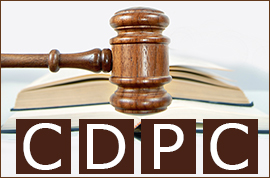About the European Committee on Crime Problems (CDPC)
CDPC Chair
Mr Fritz ZEDER, Austria

The Council of Europe, in particular through its Steering Committee (the European Committee on Crime Problems (CDPC), sets European standards and principles in a large number of binding and non-binding legal texts, identifies priorities for intergovernmental criminal law co-operation, and implements activities in the fields of criminal law and procedure, criminology and penology. Our effective intergovernmental co-operation on common and transnational criminal law and policy takes place in the broader European context, covering a full range of relevant areas including tracking, investigation, extradition, sentencing, execution of penal sanctions and measures, and rehabilitation of offenders.
Set up in 1958, the CDPC has elaborated a significant number of conventions (many of which are also open to non-member States), recommendations, declarations, as well as studies and reports. In addition to its regular meetings, the CDPC also organises conferences on specific topics of interest in the criminal law field, amongst others the Council of Europe Conferences of Ministers of Justice.
To date, over 40 Criminal law Conventions were developed under the authority of the CDPC, as well as a large number of Recommendations in areas where it was not possible or necessary to adopt a binding legal instruments.
The CDPC has provided key legal and technical guidance and oversight to many high-profile Council of Europe Conventions, including the Convention against domestic violence (leading to the Istanbul Convention), the Budapest Convention on Cybercrime, the Lanzarote Convention against Child Sexual Abuse, the MEDICRIME Convention, the Nicosia Convention on Offences relating to Cultural Property.
Further information about the mandate, current and past activities and publications of the CDPC can be found on its website: www.coe.int/CDPC
Among the topical issues of interest and concern in this field on which our Organisation is currently working are criminal law challenges posed by artificial intelligence, including self-driving cars; transnational organised crime; protection of victims’ rights; combating the illegal smuggling of migrants as well as criminal law responses to environmental crime.
The CDPC is assisted in its activities by two subordinate committees, for which it provides a coordinating, supervising and monitoring role:
The Committee of experts on the operation of European conventions on co-operation in criminal matters (PC-OC) and the Council for penological co-operation (PC-CP).
- The Committee of Experts on the Operation of European Conventions on Co-operation in Criminal Matters (PC-OC) is the forum in which, since 1981, experts from member and observer States and international organisations come together to enhance and improve international co-operation in criminal matters and agree on solutions to practical problems encountered in the application of Council of Europe Conventions in this field and in particular extradition, mutual legal assistance and transfer of sentenced persons (List of Conventions)
- The PC-OC monitors the application of these conventions and proposes new instruments when appropriate.
- It also produces helpful tools, such as country information, model forms, practical guidelines, etc. for practitioners who deal with these instruments.
- Further information regarding the functioning and activities of the PC-OC is to be found on its website (www.coe.int/tcj) which is very rich in useful information, tools and documentation for practitioners involved in international co-operation on criminal matters.
- The Council for Penological Co-operation (PC-CP) is the Committee of experts dealing with the execution of penal sanctions and measures. It drafts common European standards, in particular related to the work of the prison and probation services as well as of juvenile justice agencies.
- A number of important legal instruments have been adopted during the beginning of the existence of our Organisation by the Committee of Ministers. They are regularly updated and complemented, based on the revolving case-law of the European Court of Human Rights and the work of the European Committee for the Prevention of Torture and Inhuman or Degrading Treatment or Punishment (CPT). The most well-known texts are the European Prison Rules, the Council of Europe Probation Rules, the European Rules on community sanctions or measures, the European Rules for juvenile offenders subject to sanctions or measures and recommendations on remand in custody, health care in prison, foreign prisoners, long-term sentences, prison overcrowding, conditional release, electronic monitoring, children with imprisoned parents and restorative justice. All these instruments can be found in the Compendium. Many of them are also translated into other languages.
- The Council of Europe annual Conferences of the Directors of Prison and Probation Services (CDPPS) gather together the Directors from the 46 Council of Europe member States, as well as from its observer States and from important international organisations like the EU, UNODC, EuroPris, CEP and ICPA.
- For more than 30 years already are also being collected and published the Council of Europe Annual Penal Statistics (Statistiques Pénales Annuelles du Conseil de l’Europe – SPACE) containing data on prisons and on probation sanctions and measures (SPACE). These statistics attract a lot of media attention and are well-known worldwide.
- For more information regarding the above legal instruments, reports, publications and events, please consult the dedicated web site: www.coe.int/prison



